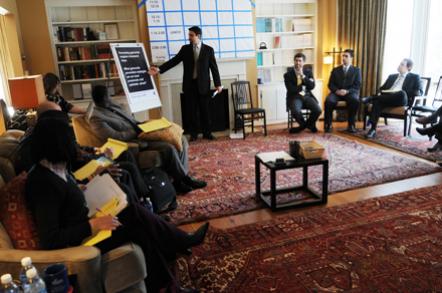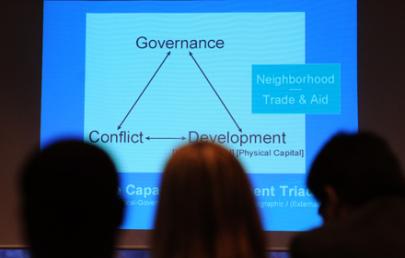Getting On Board with Genocide Prevention: Education, Training Are Key
Ph.D., University of Milan
M.A.equivalent, University of Rome
Master in Public Administration, George Mason University
B.A., University of Pittsburgh
 |
In 1948, in the wake of the human atrocities committed by Nazi Germany, the United Nations General Assembly adopted the Convention on the Prevention and Punishment of the Crime of Genocide.
More than 60 years later, Andrea Bartoli, Mason professor and Drucie French Cumbie Chair for the Institute for Conflict Analysis and Resolution (ICAR), believes the world is still struggling to understand genocidal trends and respond to threats appropriately.
“Too many times, signs of impending genocides were not identified, appreciated or acted upon, which created conditions for a re-emergence of new forms,” Bartoli says. “It is imperative that countries commit themselves to not being only passive signatories but rather active participants toward the preventive goals of the convention.”

Training sessions like this one recently held at Mason’s Point of View conflict resolution retreat facility help confront and address genocide at the government level. Photo by Evan Cantwell
Bartoli is co-editor of the book “Somalia, Rwanda and Beyond: The Role of International Media in Wars and International Crisis.”
Training in Genocide Prevention
To aid the UN in its goal to prevent genocide, Bartoli and ICAR have teamed up with Columbia University’s United Nations Studies Program and Advanced Consortium on Cooperation and Conflict Research to develop a program that trains UN member government officials in genocide prevention methods and involves the participants in a genocide prevention network.
The program, Engaging Governments on Genocide Prevention, begins with a week of training that covers the skills, motivation and access to resources needed to confront and address genocide at the government level.
According to Bartoli, the greatest challenge for workshop organizers is to find the right balance between theory and practice.
“We have met these challenges very well and have had extremely positive feedback on ways to enhance success in upcoming sessions,” he says.
In the invitation to these training sessions, Bartoli poses the question: “If you wanted to think about genocide prevention, where would you start?”
“We have had very different responses from each member state as to whom they send to the training sessions,” says Bartoli. Some countries have sent intelligence officers or diplomats; others have sent military personnel.
Once a country is invited to participate in the training session, the invitation is kept open until a representative from that country can attend. To date, only a few countries have not been able to attend the first session to which they had been invited, and all the members who have turned down an invitation have participated in a later training session.
Previous training sessions have taken place around New York City, because of its proximity to the United Nations. The latest training session took place in February at Mason’s Arlington Campus and the nearby Federal Deposit Insurance Corporation headquarters. The session concluded at Point of View, the university’s conflict resolution retreat facility located in serene Mason Neck, VA.
The training session also included a trip to New York City to meet with Francis Deng, special adviser of the United Nations secretary-general on the prevention of genocide.
Assessment Leads to Prevention Strategy
Bartoli has found that conversations about genocide are difficult to have within the member states, especially if those countries have a history of genocide. He believes the participants have more freedom in the context of these training sessions because the conversations are confidential.
“No country is doing enough to prevent genocide globally, and everybody should do a little bit more,” Bartoli says. “The goal is not only to help countries that are genocidal not to be genocidal, but also to engage every country in genocide prevention activities.”
The program encourages individual countries to prevent mass atrocities through an assessment of each country’s preparedness. These assessments require countries to reflect on their own unique experiences to determine the best strategies for combating genocide.
The training also helps create an interactive network among the participants, which encourages countries to develop early warning systems in addition to prevention policies. The network also allows participants to organize local summits on genocide prevention. As a result, these networks have the added benefit of helping isolated countries become less isolated.
Photo by Evan Cantwell
“Networks cannot be invented; they must be built naturally over time,” says Bartoli. “We have found that human relation networks tend to work better than artificial electronic networks.”
Bartoli says that the program’s success will be determined by the extent to which the participants coordinate policy development and share resources and information. The network of trained professionals has now grown to 56 countries, with another 15 countries scheduled to be trained in May.
Most of the costs associated with the training have been covered by organizations such as the Ford Foundation, the U.S. Institute for Peace, Humanity United and the Bridgeway Foundation. The governments of Sweden and Switzerland have also contributed funds, and the program receives part of the annual revenues from the Master’s in Negotiation and Conflict Resolution Program at Columbia University.
Bartoli first became interested in the study of genocide prevention around 2003. While studying conflict prevention, he was unable to find a large number of publications focusing on preventing genocide. “It is conceptually very difficult to imagine the prevention of genocide, which explains why there was so little material on the subject.”
Bartoli notes that in the United States genocide prevention is a bipartisan issue, with both parties doing much and working together.
“My hope for this project is that [ICAR and Mason] will engage the Washington community more.”
Bartoli and his colleagues will have the opportunity to work on some of these worldwide relationships when Mason and ICAR host the 2009 biennial meeting of the International Association of Genocide Scholars in June.
By James Greif
This article appeared in a slightly different form in Mason Research 2009.
This material is presented as the original analysis of analysts at S-CAR and is distributed without profit and for educational purposes. Attribution to the copyright holder is provided whenever available as is a link to the original source. Reproduction of copyrighted material is subject to the requirements of the copyright owner. Visit the original source of this material to determine restrictions before reproducing it. To request the alteration or removal of this material please email [email protected].
rosters
IMPORTANT LINKS
- Home
- Admissions
- Academics
- Research & Practice
- Center for Peacemaking Practice
- Center for the Study of Gender and Conflict
- Center for the Study of Narrative and Conflict Resolution
- Center for World Religions, Diplomacy, and Conflict Resolution
- Indonesia - U.S. Youth Leadership Program
- Dialogue and Difference
- Insight Conflict Resolution Program
- Parents of the Field Project
- Program on History, Memory, and Conflict
- Project on Contentious Politics
- Sudan Task Group
- Undergraduate Experiential Learning Project
- Zones of Peace Survey
- News & Events
- Student and Career Services
- Alumni
- Giving





